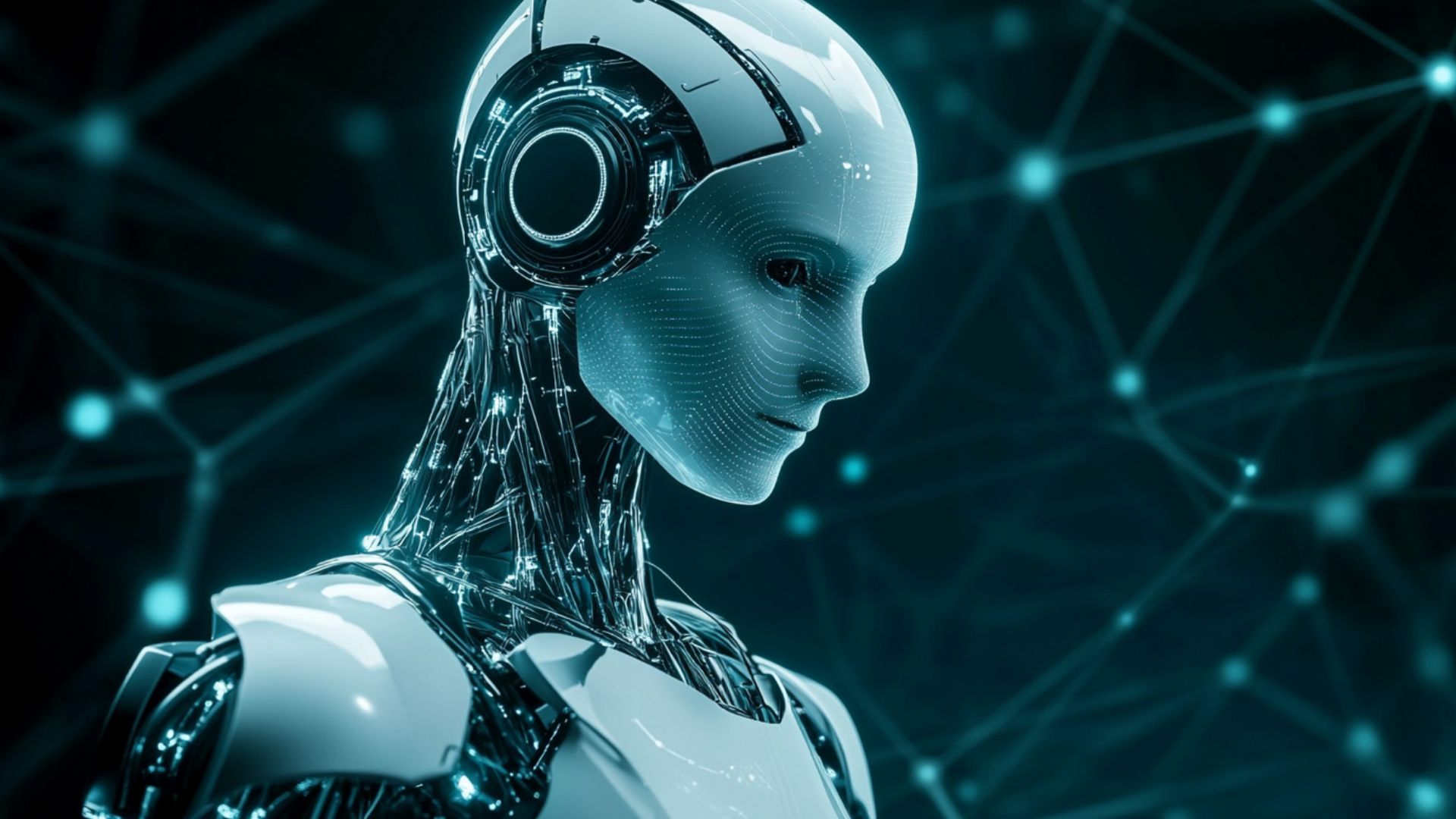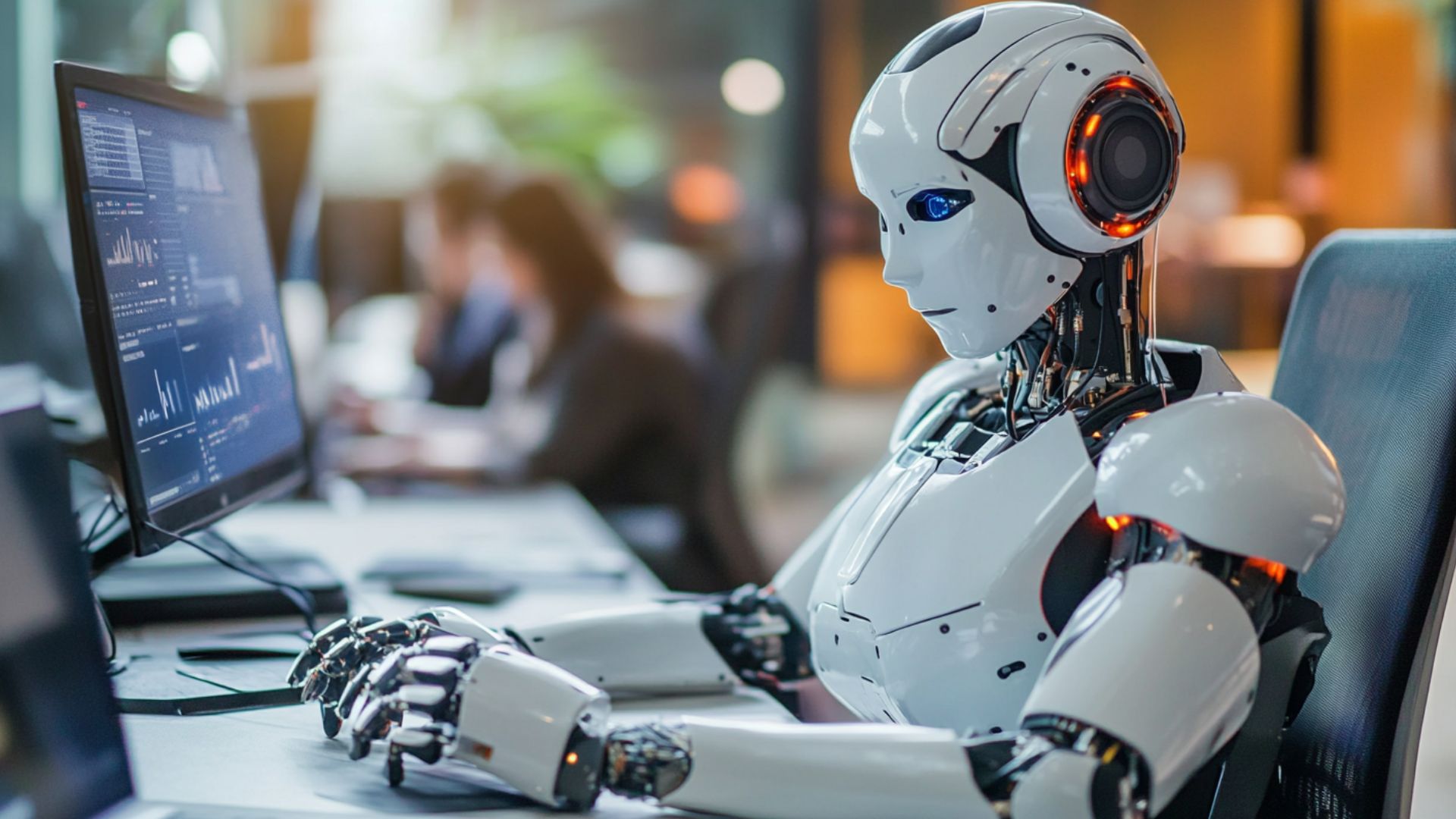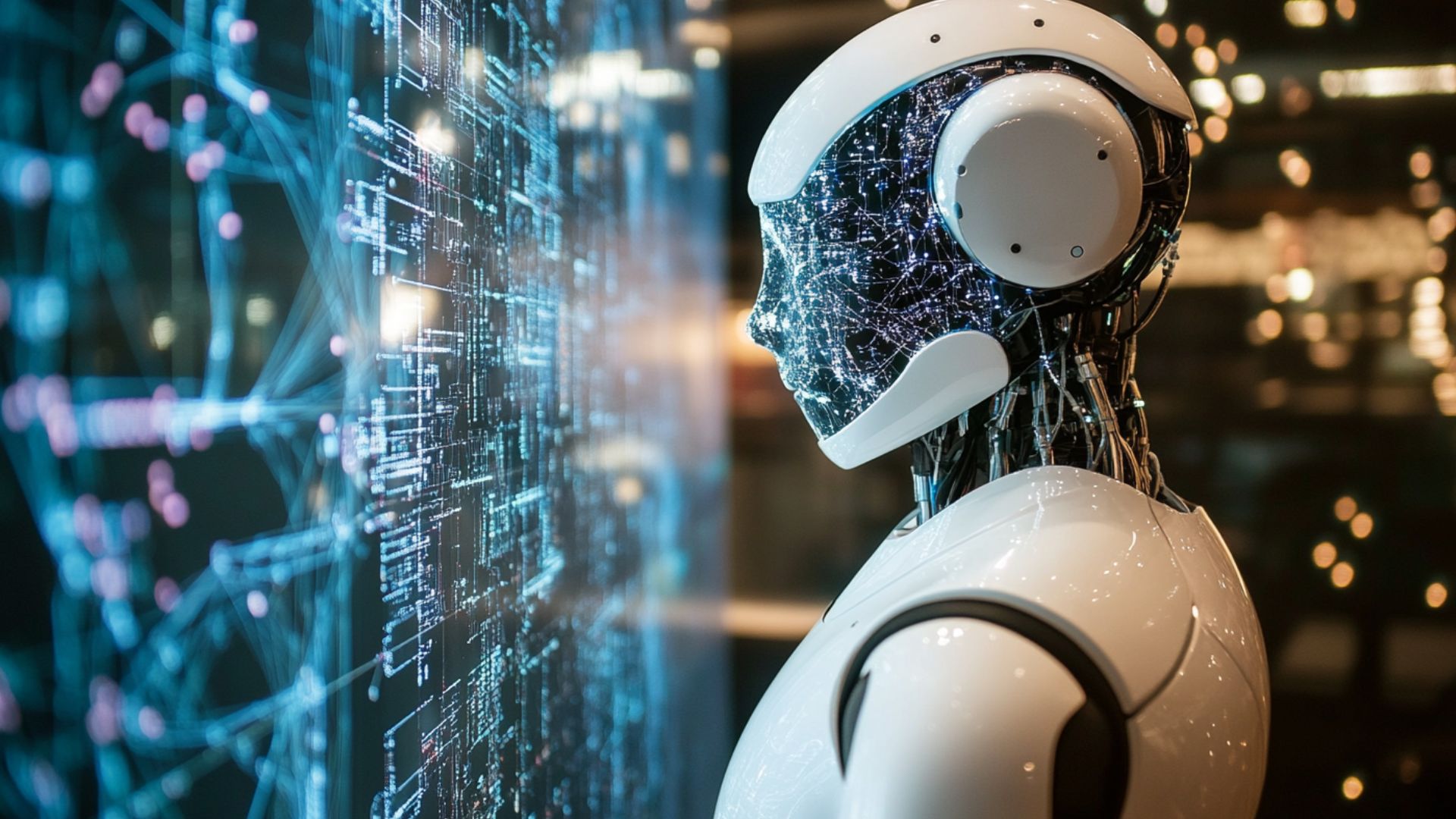AI in Business Automation: How AI Transforms Workflows & Boosts Efficiency

Do you see yourself as a business leader? We have prepared some effective methods. Businesses prosper by leveraging all available techniques. They are typically used for business and robotic process automation (BPA\RPA). These tools are entirely different.
The development of digital technologies is accelerating. It focuses on the creation of software. Artificial intelligence (AI) shows terrific results. Previously, only large corporations with multimillion-dollar budgets could apply it to their needs. By 2025, the situation will change in favor of medium and small firms. Using AI to make money is no longer new. This is an essential tactic.
AI in business integration is a perfect solution. A study shows that 77% of entrepreneurs have already engaged or plan to do this. It is hard to maintain competitive advantage over competitors. Newo.ai will help you achieve this goal. Automated tools offer automation and competitive opportunities in every industry. They help predict and adapt and free up time for strategic development. This is possible even in small companies. So, let’s get started.
The Role of AI in Business Process Automation
BPA is a sophisticated technology. It streamlines workflows. BPA is the delegation of routine processes to automated tools. You can automate many different routine processes. AI can count sales and profits, manage projects, and work with staff. You also may automate communication with clients, placing orders, and managing the website. AI-powered automation goes beyond pre-defined rules. It handles a large volume of work.
There are many key advantages:
- Adaptive Learning: AI systems refine their processes over time. It improves capacity and accuracy.
- Intelligent Decision-Making: AI can assess multiple factors in real time. It enables smarter, data-driven conclusions.
- Cognitive Automation: AI-powered systems handle unstructured data, including emails, voice commands, and documents. Such systems reduce manual effort.
There are AI automation examples:
- Chatbots & Virtual Assistants: These tools automate client service interactions. They shorten answer times. Such tools improve consumer experience.
- Document Processing: Such technology accurately extracts and processes information. It comes from invoices, contracts, and forms.
- Predictive Analytics: Identifies trends and anomalies. It optimizes supply chain control and fraud detection.
- RPA + AI: Such a combination enhances bots with modern capabilities. It enables them to handle exceptions and adapt to complex tasks.
- Intelligent Workflow Automation: AI streamlines HR processes, IT service management, and financial operations. It automates repetitive and decision-based tasks.
AI automation evolves to gain greater cost savings and agility. It makes automated tools an essential driver of modern process automation.
Key Technologies Driving AI Automation
The main tools are vital to transforming automation. They enable systems to go beyond rule-based actions and make intelligent decisions. We have prepared some AI for business automation solutions:
- Machine Learning (ML): This technology recognizes patterns and makes predictions. Companies use ML for demand forecasting, fraud detection, and client behavior analysis. Over time, these models continuously improve by processing new data. They refine their accuracy and adapt to dynamic environments.
- Natural Language Processing (NLP): AI can understand, interpret, and generate human speech. It powers chatbots, virtual aids, and automated client support systems. NLP-driven tools enhance communication and streamline workflows. They also improve user experiences. Such tools analyze sentiment, context, and intent.
- Robotic Process Automation (RPA): This technology automates rule-based, repetitive tasks. They are data entry, invoice processing, and compliance checks. When integrated with AI, RPA becomes more intelligent. It handles exceptions, learns from errors, and optimizes processes over time.
AI for business automation solutions continuously adapts. It improves through feedback loops and data-driven refinement. Self-learning algorithms enhance accuracy. Predictive models become more reliable, and computerized workflows evolve. They handle complex tasks with minimal human intervention. AI-driven industrialization advances. It is an essential component of modern enterprise operations.
Benefits of AI in Business Workflows
Integrating automation brings several significant advantages. They help corporations streamline workflows and improve overall performance. By automating tasks with AI, organizations can achieve increased efficiency. They may reduce expenses and enhance accuracy across their operations. There are some crucial benefits of AI business integration:
- Increased Efficiency: AI automates repetitive tasks. It allows employees to focus on more strategic, high-value work. Processes that once required hours of manual input can now be generally completed in minutes. It frees up time for innovation and growth. This is particularly true in data entry, client support, and inventory management.
- Enhanced Accuracy: AI systems minimize human error. They ensure that tasks are typically completed with a higher degree of precision. Whether processing financial data or responding to client inquiries. AI ensures that operations run smoothly and without mistakes.
- Cost Reduction: Industries can significantly cut them by leveraging AI in automation. It reduces the need for large labor forces, decreases errors, and eliminates inefficiencies. Over time, this results in lower overhead costs and improved profitability.
- Better Decision-Making: AI systems analyze large volumes of data. They may identify trends and offer actionable insights. This enables decision-makers to make more informed, data-driven choices. AI tools improve enterprise strategies and predict market trends.
Companies can transform their workflows by integrating AI. They benefit from greater efficiency, reduced expenses, and more intelligent problem-solving. Such processes drive long-term success.
AI-Powered Solutions for Business Automation
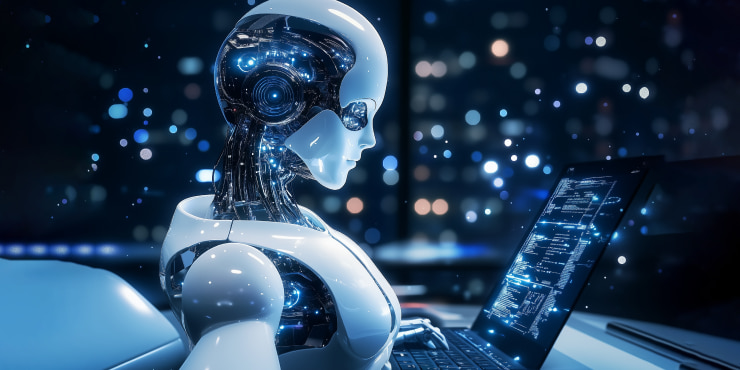
Computerized tools have revolutionized the way companies streamline operations. It significantly increases productivity. Firms must incorporate AI into workflow automation tools and software. They can reduce human intervention. It allows employees to focus on higher-level tasks. These tools leverage automation to perform repetitive and complex processes seamlessly. They reduce errors and save valuable time.
How does automation help businesses? Let’s explore:
- Data Entry and Processing: AI can automatically input, organize, and validate large amounts of data. It eliminates manual errors and speeds up the process.
- Client Support: AI-powered chatbots can handle routine inquiries. They provide quick and accurate responses. Such tools reduce the workload on customer service teams.
- Invoice and Payment Processing: AI automated invoicing, verifies payments, and ensures accurate transactions. It reduces financial errors and administrative overhead.
- Predictive Analytics: AI can analyze company data to predict trends. It helps corporations make informed decisions on inventory, sales, and marketing. Examples of AI automation include the use of predictive analytics for demand forecasting. They involve optimizing supply chain management and personalizing marketing strategies. They are entirely based on client behavior.
- Marketing Automation: AI tools can segment audiences and create personalized content. It optimizes ad campaigns. AI enhances marketing efforts and consumer engagement.
- Supply Chain Optimization: AI-driven systems can predict demand fluctuations and optimize logistics. They ensure timely deliveries and reduce operational costs.
Enterprises must leverage AI. They can enhance their workflow efficiency. Companies can reduce costs and increase overall productivity.
AI in Task & Process Automation
Automation has become essential in automating various tasks across industries. It increases efficiency and reduces manual effort. How to use AI for business task automation? Let's talk about it:
- Automating Data Entry: AI tools can quickly capture and input it from different sources. They are forms, emails, and documents in databases or systems. Such tools eliminate human errors and speed up the process.
- Document Processing: Automated systems can read, categorize, and extract data. They do it from invoices, contracts, and receipts. This reduces the need for manual document handling. It increases accuracy.
- Automating Communication: What is business automation? It uses technology to streamline repetitive tasks. Automation also improves efficiency. AI chatbots can handle client inquiries, emails, or messages across various platforms. They provide real-time responses. It allows human agents to focus on complex issues.
- Client Service AI improves response time and personalization. AI algorithms analyze consumer queries, predict their needs, and offer tailored solutions. It enhances the overall client experience.
- HR Processes: AI also transforms these operations. It will automate the recruitment process. They range from screening resumes to scheduling interviews. AI can analyze employee performance data. It also recommends training programs. Automation may even predict potential employee turnover.
Using AI for automation streamlines operations and reduces labor costs. It also drives consumer satisfaction. Integrating AI across departments can improve process speed, innovation, and efficiency.
AI for Business Decision-Making
Automation improves the problem-solving process. It provides valuable insights. They come through predictive analytics and support strategic planning. How can companies use AI in their processes? Let's explore:
- Predictive Analytics: AI algorithms can analyze historical data and identify trends. They enable enterprises to forecast future outcomes accurately. This helps make informed decisions on product launches, market expansions, and more.
- Strategic Planning: AI can process large datasets to identify patterns, risks, and opportunities. They might be generally overlooked. It aids in long-term strategic planning. AI provides actionable insights. They are typically based on data-driven predictions.
There are real-world applications of AI business automation in various industries, including:
- Finance: AI is widely used in such services. It predicts market trends, optimizes investment strategies, and detects fraud. It assists in making data-driven decisions about risk management and resource allocation.
- Marketing: AI tools help businesses segment clients and personalize campaigns. They predict customer behavior. Such tools lead to more targeted and efficient marketing strategies.
- Operations: AI improves supply chain management, forecasts demand, and automates resource allocation. It leads to cost savings and enhanced efficiency.
AI in business process management empowers companies to make smarter, faster decisions. It helps them to optimize operations across various departments.
Challenges & Considerations in AI Business
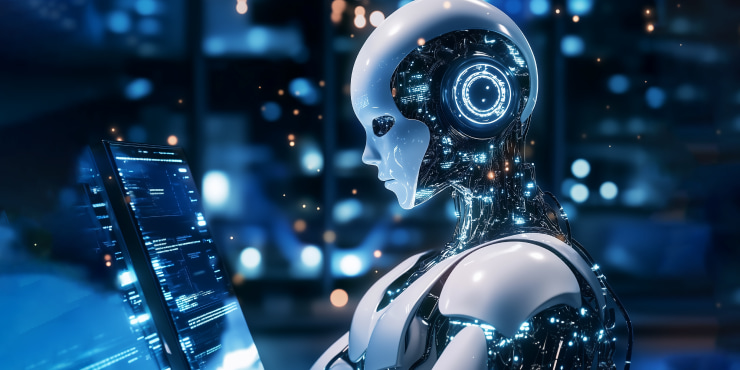
Automation offers many benefits. Enterprises face several challenges when adopting it. Below are common obstacles, as well as ethical concerns and workforce implications. Let's check them:
- Data Quality and Availability: AI relies on valuable information for training algorithms. Many businesses struggle with gathering, cleaning, and structuring data. This leads to inefficiencies or inaccurate predictions from AI systems.
- Integration with Existing Systems: Using AI tools with them can be complex. Sometimes, it is also costly. Integration requires specialized skills. It can disrupt operations if not handled properly.
- Lack of Skilled Talent: AI requires expertise in machine learning, data science, and system integration. The shortage of skilled professionals can slow the adoption of AI. It hinders the desired outcomes.
AI becomes more involved in company automation. Ethical and workforce-related issues need to be addressed:
- Bias and Fairness: AI systems may inadvertently perpetuate them in the data. They are typically trained on it. This can lead to biased decisions in hiring, client service, or loan approvals. It creates fairness concerns.
- Privacy Issues: AI often involves collecting and analyzing personal data. Corporations must comply with data protection regulations. They should handle sensitive information responsibly.
- Job Displacement: Automation could replace them, especially in roles focused on repetitive tasks. Industries must consider the impact on employees. They should invest in reskilling or redeploying their workforce. It helps them to avoid unemployment and retain talent.
AI task automation has transformative potential. Companies must carefully manage data management, integration costs, and workforce impact. Addressing ethical concerns will also be essential for responsible AI deployment.
The Future of AI in Business Process Management
The future of computerized tools is rapidly evolving. Emerging trends promise to revolutionize all operations. Here's a look at what the future holds. Let's discuss it:
- Predictive Analytics: AI will further enhance its role in this area. It helps companies accurately forecast market trends, consumer behaviors, and operational challenges. This will enable corporations to make proactive, data-driven decisions rather than reactive ones.
- Task Automation Advancements: AI continues to improve. Task automation will become more sophisticated. It will handle increasingly complex tasks. This includes automating problem-solving, client interactions, and even creative processes. It reduces the need for human intervention.
- RPA Integration: AI will lead to more seamless end-to-end automation of processes. RPA, when combined with automated, can handle structured and unstructured data. This makes it more innovative and efficient.
- AI-Powered Decision Support Systems: AI will increasingly assist problem-solving. It provides real-time insights, scenario analysis, and risk assessments. This will allow companies to come up with the right solutions. It is crucial in a dynamic marketplace.
There are predictions for AI business process automation in the next decade. Let's check them:
- Greater Adoption Across Industries: AI will expand beyond tech-focused industries in the next decade. It transformed the healthcare, retail, finance, and logistics sectors.
- Personalized Client Experiences: AI will further analyze vast data. It will tailor services and products to individual needs. AI significantly enhances client loyalty.
- Workforce Partnership: Automation will evolve to collaborate with employees rather than replace jobs. It will augment their capabilities and boost capacity. This will lead to a more synergistic relationship between humans and machines.
Entrepreneurs will drive agility and innovation in the digital era. Follow Newo.ai to get professional help.
